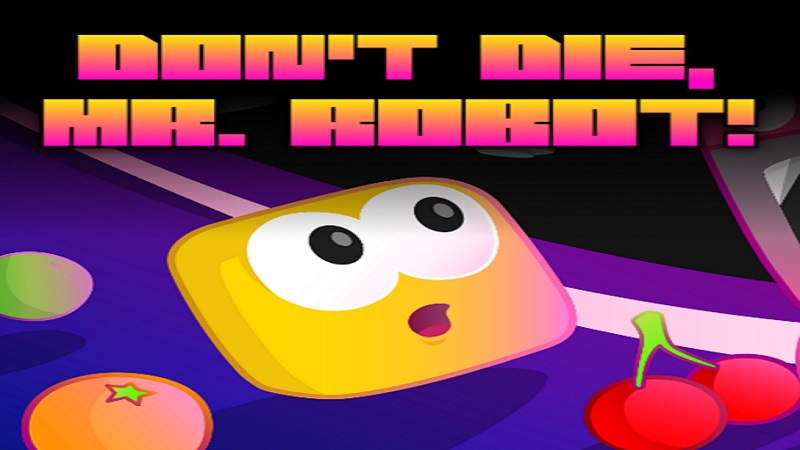Don’t Die, Mr. Robot is an arcade game available for download from the PlayStation Store for the PS4, PS Vita and PlayStation TV. Infinite State Games have previously developed Shepherd: Mars Needs Sheep in 2012 and Frutorious in 2013 that both have fun and unique concepts, but can Don’t Die, Mr. Robot achieve the same kind of fun and unique gameplay?
https://www.youtube.com/watch?v=8Gm9avpFpcA
There are four game modes including: Remix Mode, Arcade Mode, Time Attack and Chill Out. The Remix Mode contains 10 stages, although only the first stage is initially available to play as you have to unlock the other 9 stages by earning points from your in-game performances as the second stage requires 10 points which gradually accumulates to 180 points required for the tenth stage. Each stage has different objectives such as surviving as long as possible, destroying enemies with fruit, grazing enemies to earn danger bonuses, collecting apples and much more besides which is a massively positive design choice for having such gameplay variety.
Arcade Mode, Time Attack and Chill Out are all unlocked as soon as you have completed the first two stages of the Remix Mode. Arcade Mode is essentially an endless survival mission, while Time Attack is against the clock as you have 2 and a half minutes to earn as many points as possible with some twists and turns as you will not only lose points but also time for your character being killed, alongside the Chill Out Mode which allows you to play the game at a more tranquil pace.
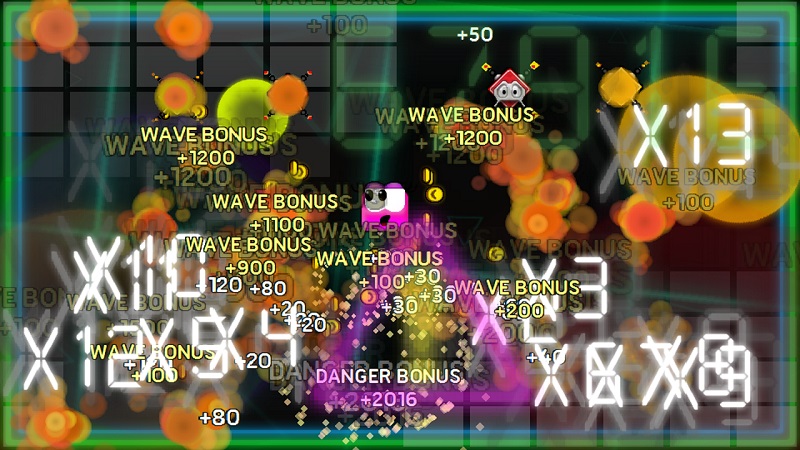
Fruit regularly appears on screen, exploding when your character makes contact with it which produces a blast radius that destroys enemies caught within that range. There is a risk and reward factor as leaving fruit to build up without using any increases the chances of multiple enemies closing in on your location and trapping your character from any possible escape route, although it is a worthy risk as it will set off a huge chain reaction of epic proportions and quite appropriately earn a points multiplier in the process.
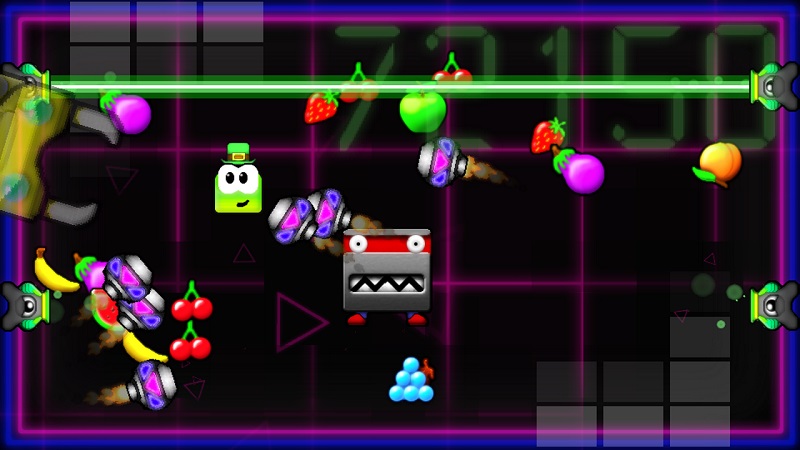
You can spend the coins you collect throughout the stages and game modes in the shop on purchasing power-ups including enhancements to your shield, blast, speed and magnet ranging from 10 to 30 coins each; changing your appearance in regards to the colour and accessories such as a variety of hats and sunglasses and switching between male and female characters; and special guests that allow you to entirely change characters as a homage to other indie games such as Death Ray Mantra.

Environment design is rather basic with just a grid of lasers and some colour around the edges of the grid, although this is perfectly acceptable as this kind of gameplay is all about spotting the enemies, therefore the design choice to have simple backgrounds in order to not detract from enemies or your position is one that has been perfectly executed.

The lead character is simplistic in its design yet so charming in a Pacman style, while the enemies come in a variety of colours, lengths, widths, shapes and sizes which take random paths through the grid and spawn quicker as you continue to survive the waves of enemies, which are all certainly positive design choices as it keeps the gameplay at an exciting and frantic pace.

There is a lot of humour that particularly resonates from the robotic voice-over which provides such encouraging comments as instructing you followed by exclaiming, “Try not to die”¦Spoilers, you will die!” as well as congratulating you on a huge chain to shout, “Good golly, Miss Molly!”
Don’t Die, Mr. Robot supports cross-buy between the PS4 and Vita, although it unfortunately does not support cross-save, so you will not be able to continue from your previous progression on the Vita version when playing the PS4 version and vice versa. Cross-buy presents a superb amount of value as it means that you will be purchasing the PS4 and Vita versions of the game with just a single purchase.
The controls are well mapped to the Vita as they are simplistic and yet deliver three control schemes consisting of the left or right analogue sticks and d-pad, rear touch pad and tilting via the gyroscopic motion sensing functionality to move your character, alongside pressing start to display the pause menu. The PS4 version retains the analogue sticks, d-pad and gyroscopic motion sensing functionality, although there is no touch pad control scheme, while the light bar reflects the colour of the background grid and vibration occurs when an enemy has collided with your character.
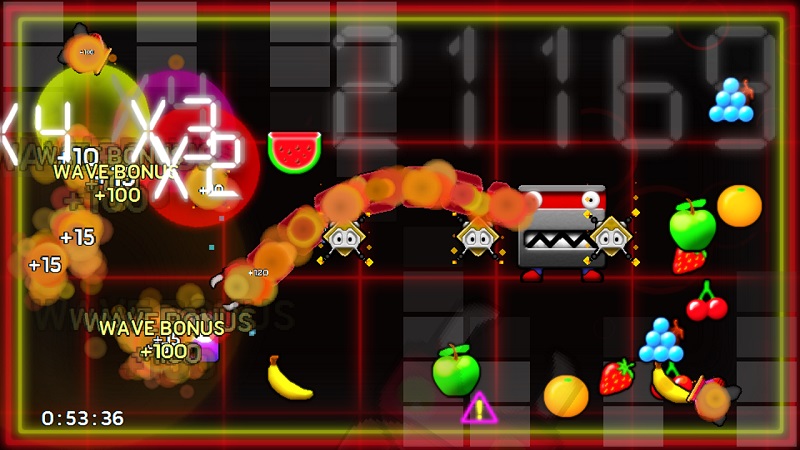
The graphics are simplistic yet effective as the background does not have much detail besides some colour, although there are potentially many enemies on screen at once which showcases consistent performance without any frame-rate drops despite the variety of enemies and graphical effects produced after destroying enemies, while the PS4 version is 1080p at 60 frames-per-second.
The presentation of the game is solid with a great touch screen based user interface across various menus on Vita such as the main menu, game mode menus, online leaderboards menu, options menu and various gameplay menus with support for navigation via the left and right analogue sticks, directional pad and face buttons on Vita and DualShock 4, although it does not include support for navigation via the rear touch pad on Vita or the touch pad on DualShock 4, while the background of every menu revolves around a grid of swirling laser beams.
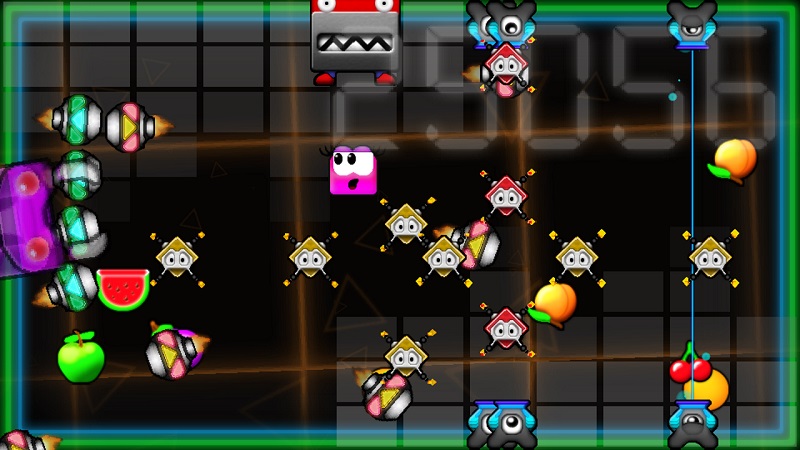
The audio consists of voice-overs, sound effects and music with the voice-overs informing you of your progress in regards to when you have successfully achieved a particular medal, producing sarcastic tones of how miserably you will fail in your attempt at meeting your objectives and admiration for achieving an objective or creating a chain of destroyed enemies, while the sound effects include collecting coins and fruit as well as the explosion that occurs when collecting fruit leading to the destruction of enemies, alongside a dance and techno music soundtrack. The DualShock 4 speaker eventually comes into play during later stages by producing a siren, although it would have been better utilised if the robotic voice would have came through the speaker.
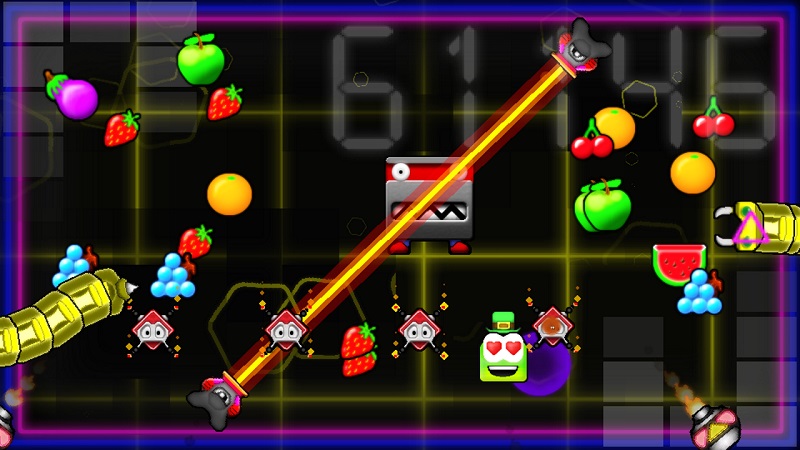
The trophy list includes 13 trophies with 9 bronze trophies, 3 silver trophies and 1 gold trophy. Easier trophies include the Starting Out bronze trophy for completing the tutorial comprising of the first couple of levels in the Remix Mode; the Miser bronze trophy for lasting 20 seconds without collecting a fruit in Arcade Mode; and the Martyr bronze trophy for dying when there are at least 10 fruits on screen and having not scored any points. Harder trophies include the Gold Run silver trophy for getting all of the gold medals and the Going Platinum gold trophy for getting all of the platinum medals. It is estimated that depending upon skill and a good trophy guide to provide some helpful tips that it would take between 5 to 10 hours to 100% the trophy list.
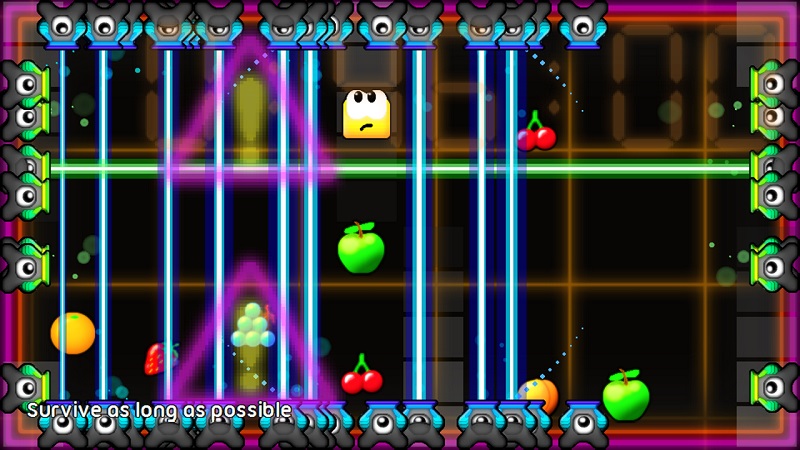
There are no difficulty levels, although there is a unique difficulty curve for each game mode as power-ups will be enabled or disabled which certainly varies the gameplay and makes it more or less challenging depending upon which game mode you have selected, while the enemies will always have random paths across the grid as well as more entering the grid as you continue to survive for a longer period.
There are no local or online multiplayer modes which is surprising as the game would be perfect for time, points or enemies destroyed based competitive multiplayer in pass the Vita gameplay, while the PS4 version could have introduced local same screen competitive and co-operative versions of all single player game modes, alongside the possibility of local multiplayer making the leap to online multiplayer.
However, there are online leaderboards focused on global scores, friends scores and top scores with each leaderboard containing each player’s rank; name (PSN ID); points score; and robot with the positioning of each player based upon their total points scores for each category including arcade normal, arcade pure, remix mode, time attack, chill out mode and total coins, which totals to 18 leaderboards.
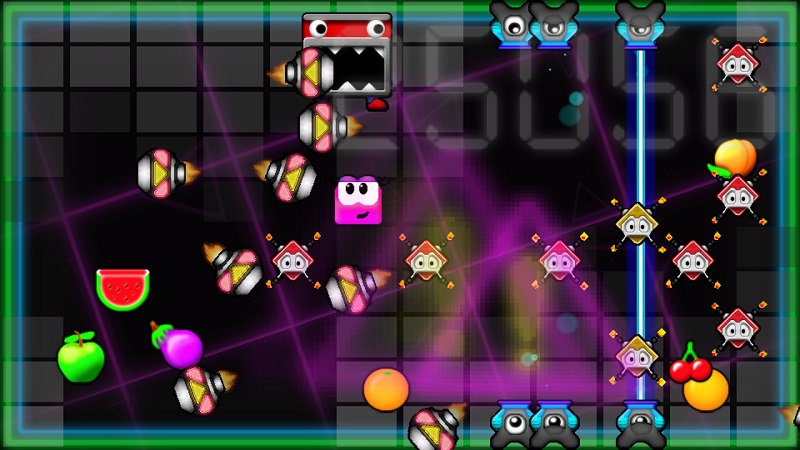
Replayability stems from the diversity of rules and objectives within the four game modes, while online leaderboards provide a competitive edge to the gameplay and the amount of character customisation options available to purchase with in-game currency earned from destroying as many enemies as possible all combine together to encourage the player to have one more try.
Analysis
– Title: Don’t Die, Mr. Robot
– Developer: Infinite State Games
– Publisher: Infinite State Games
– System: PS4/PS Vita/PlayStation TV
– Format: PSN Download
– Cross-Buy: Yes (PS4/PS Vita/PlayStation TV)
– Cross-Play: No
– Players: 1 (Online Leaderboards)
– PS Vita Memory Card Space Required: 217MB/ PS4 Hard Drive Space Required: 93.72MB (Version 1.01)
